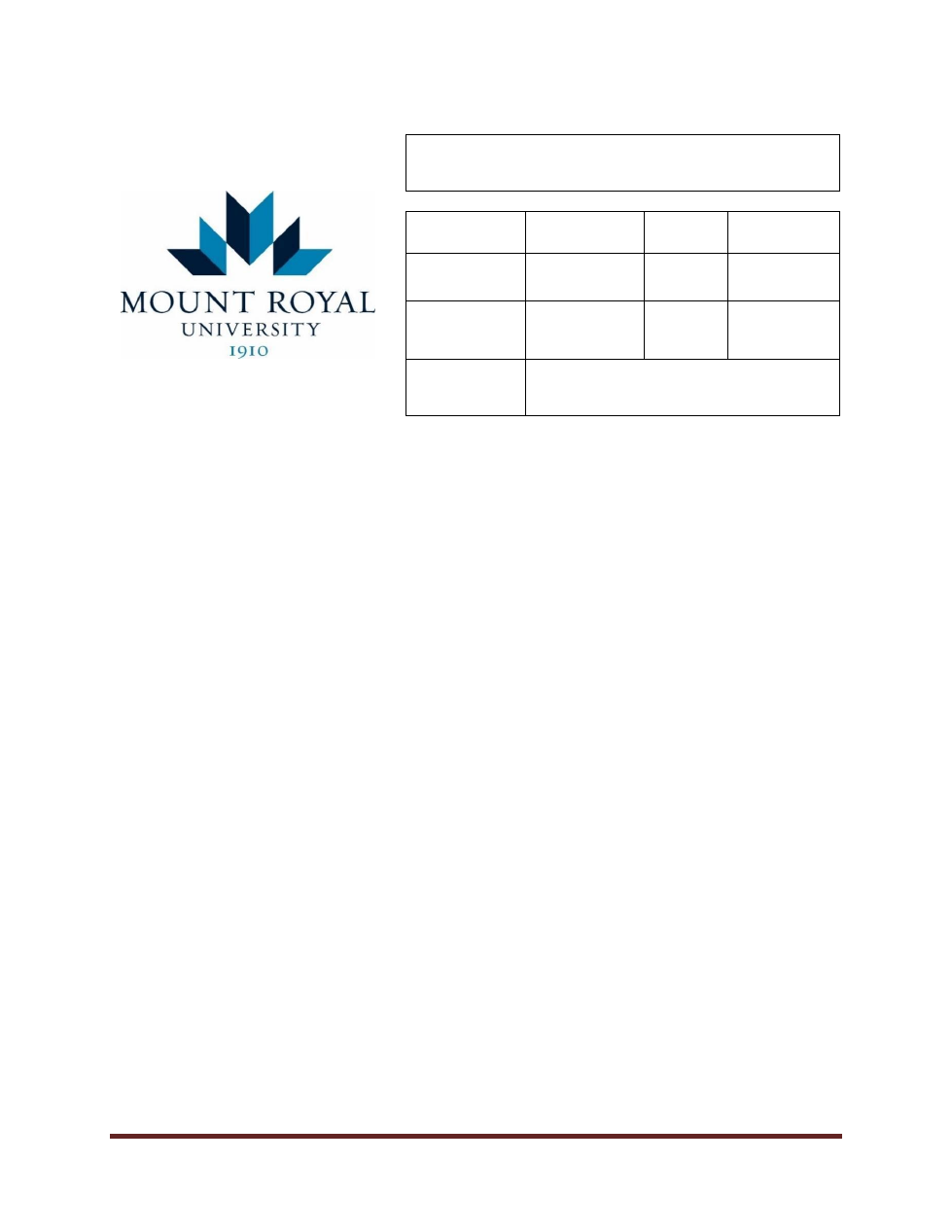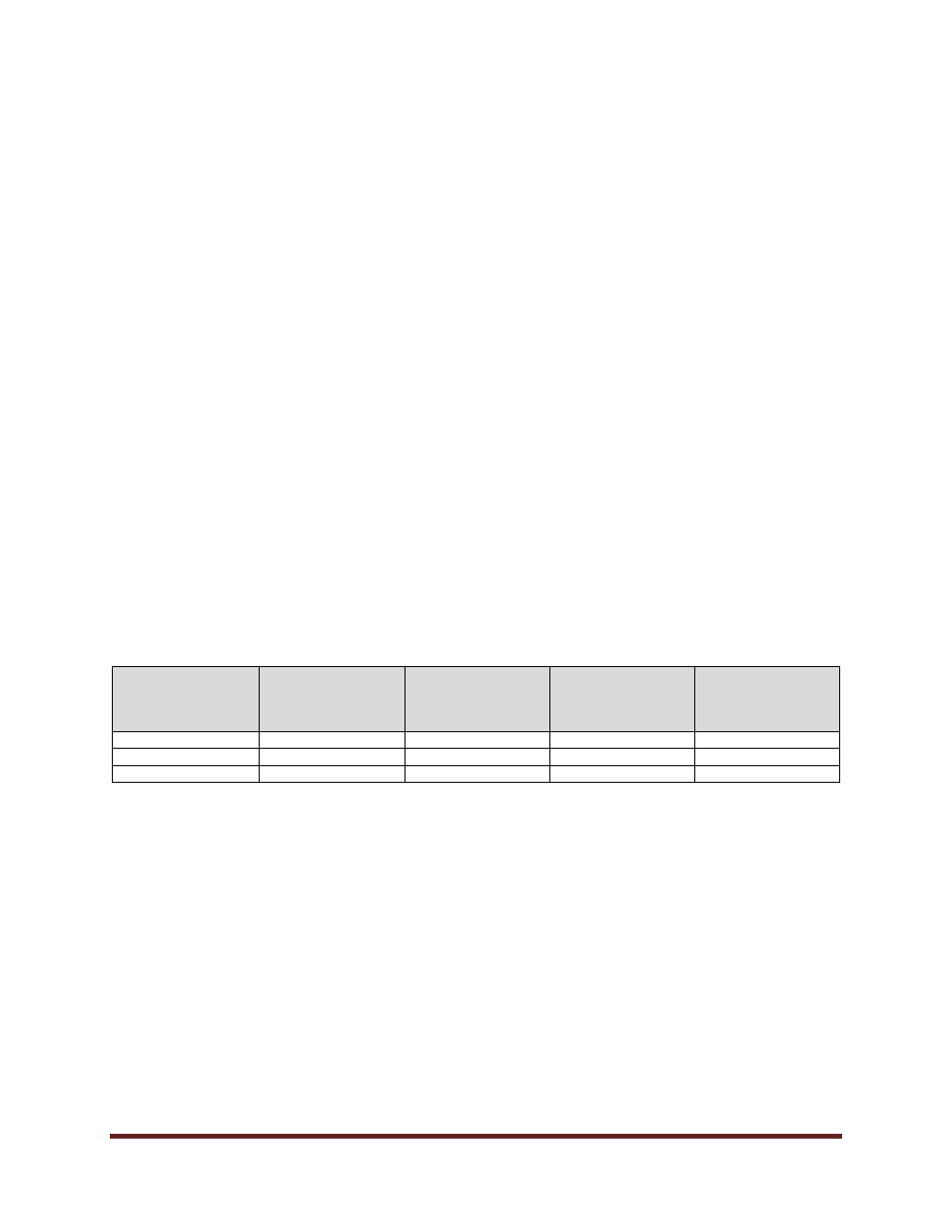
Non-Ministry Approved Curriculum Policy – May 28, 2024 Page 1 of 5
NON-MINISTRY
APPROVED
CURRICULUM
POLICY
Policy Type:
Management
Initially
Approved:
May 28, 2024
Policy Sponsor:
Provost and Vice-
President,
Academic
Last
Revised:
Primary Contact:
Dean, Faculty of
Continuing
Education and
Extension
Review
Scheduled: May 28, 2029
Approver:
Board of Governors
A.
PURPOSE
The Non-Ministry Approved Curriculum Policy governs the approval, development, and criteria of
Courses and Programs by establishing consistency in the definitions, guidelines, and processes
associated with Course and Program approval.
B.
SCOPE
This Policy applies to the non-ministry approved curriculum offered at Mount Royal University. All
non-ministry approved Courses and Programs offered at Mount Royal University are offered
through the Faculty of Continuing Education and Extension. Non-ministry approved curriculum is
a non-ministry approved Course or Program where formal recognition in the form of a parchment,
transcript or confirmation of completion can be issued.
C.
POLICY STATEMENT
1. RESPONSIBILITY
1.1
It is the responsibility of the Provost and Vice-President, Academic to ensure this
policy is implemented and maintained.
2. CREDENTIAL DEFINITIONS AND GUIDELINES
2.1
Certificate of Completion
2.1.1 A certificate of completion offers professional or personal development
opportunities designed to give recognition to learners who have completed or
attended courses in a particular subject area.
2.1.2 A certificate of completion must be less than 60 instructional hours and
consist of at least two (2) required Courses. Required Courses may be
prescribed or a series of options from which a specified number may be
selected.
2.2
Extension Certificate
2.2.1 An extension certificate is a university-recognized professional program that

Non-Ministry Approved Curriculum Policy – May 28, 2024 Page 2 of 5
provides individuals with a range of professional skill sets, usually specialized
in one area of study.
2.2.2 An extension certificate must be more than 60 instructional hours and consist
of at least three (3) required Courses. Required Courses may be prescribed
or a series of options from which a specified number may be selected.
2.2.3 An extension certificate has a rigorous curriculum and assessment that
adheres to the University grading scale.
2.3
Micro-Credential
2.3.1 A micro-credential is awarded to recognize skills or knowledge that meet a
specific function within an industry, community, or educational program.
2.3.2 A micro-credential may be supplementary, alternate, or supportive to a
component of other post-secondary credentials.
2.3.3 A micro-credential is short in duration, normally less than 45 instructional
hours.
2.3.4 A micro-credential has a rigorous curriculum and assessment that adheres to
the University grading scale.
2.4
Certification and Professional Designations
2.4.1 A Course or Program may qualify for external certifications and professional
designations.
3. COURSE AND PROGRAM APPROVAL PROCESS OVERVIEW
The following overview outlines the curriculum submission approval paths for non-ministry
approved curriculum.
3.1
Extension Certificates and Micro-Credentials
3.1.1
New Program and Terminate Program
The steps below outline the approval steps for creating a new Program or
terminating a Program that leads to an extension certificate or micro-
credential.
3.1.1.1 Originator (submit proposal)
3.1.1.2 Systems Support Analyst (review)
3.1.1.3 Senior Program Manager (recommend for approval)
3.1.1.4 Dean (recommend for approval)
3.1.1.5 Provost and Vice-President, Academic (
final approval)
3.1.1.6 Academic Programs and Curriculum Committee (for information
only)
3.1.1.7 General Faculties Council (for information only)
3.1.2
Program Modifications and Suspend Program
The steps below outline the approval process for a change to a Program or
suspension of a Program that leads to an extension certificate or micro-
credential.

Non-Ministry Approved Curriculum Policy – May 28, 2024 Page 3 of 5
3.1.2.1 Originator (submit proposal)
3.1.2.2 Systems Support Analyst (review)
3.1.2.3 Senior Program Manager (recommend for approval)
3.1.2.4 Dean (
final approval)
3.2
Certificate of Completion
3.2.1
New Program, Suspend Program, Terminate Program, and Program
Changes
The steps below outline the approval process for creating a new Program,
suspending a Program, terminating a Program, or making a change to an
existing Program that leads to a certificate of completion.
3.2.1.1 Originator (submit proposal)
3.2.1.2 Systems Support Analyst (review)
3.2.1.3 Senior Program Manager (recommend for approval)
3.2.1.4 Dean (
final approval)
3.3
Courses
3.3.1
New Course and Course Changes
The steps below outline the approval process for creating a new Course or
making a change to an existing Course.
3.3.1.1 Originator (submit proposal)
3.3.1.2 Systems Support Analyst (review)
3.3.1.3 Senior Program Manager (
final approval)
4. CURRICULUM APPROVAL PROCESS ROLES AND RESPONSIBILITIES
The following overview outlines the responsibilities of the roles involved in the curriculum
approval process outlined in section 3.
4.1
Originator is responsible for:
4.1.1 determining the appropriate approval path;
4.1.2 consulting with the appropriate individuals or groups;
4.1.3 completing the curriculum proposal form;
4.1.4 ensuring the information contained in the curriculum submission is accurate
and complete; and
4.1.5 resolving feedback collected during the approval process.
4.2
Systems Support Analyst is responsible for:
4.2.1 ensuring the curriculum submission is following the correct approval path;
and
4.2.2 ensuring the data on the curriculum submission is accurate and complete.
4.3
Senior Program Manager is responsible for:
4.3.1 assessing the content, budget implications, and cross impacts (e.g., student,
other programming, etc.);
4.3.2 identifying opportunities for collaboration outside of the Faculty; and
4.3.3 providing budget approval for the Course or Program offerings.
4.4
Dean is responsible for:

Non-Ministry Approved Curriculum Policy – May 28, 2024 Page 4 of 5
4.4.1 identifying and assessing overall budget implications and cross-impacts;
4.4.2 identifying opportunities for collaboration outside of the Faculty;
4.4.3 ensuring potential impacts on programs and courses outside of the Faculty
have been addressed; and
4.4.4 ensuring the Course or Program aligns with the goals of the Faculty and the
University.
4.5
Provost is responsible for:
4.5.1 ensuring that potential impacts on programs and courses outside of the
Faculty have been addressed;
4.5.2 identifying opportunities for collaboration outside of the Faculty; and
4.5.3 ensuring the Course or Program aligns with the goals of the Faculty and the
University.
4.6
Academic Program and Curriculum Committee is responsible for:
4.6.1 reviewing curriculum submissions for information; and
4.6.2 highlighting potential areas of opportunities.
4.7
General Faculties Council is responsible for:
4.7.1 reviewing curriculum submissions for information; and
4.7.2 sharing information on new and terminated programs to the Board of
Governors via General Faculties Council meeting minutes.
5. QUALITY ASSURANCE
5.1
Course and Program information is reviewed and validated for quality assurance
purposes by the programming area and applicable experts from advisory committees,
subject matter experts, and industry professionals.
5.2
The process of reviewing and validating Course and Program information occurs at
the time a new Course or Program is being developed, during the program review
process, and at any time student evaluation of instruction, student demand, or market
demand warrants it.
5.3
A timeline for the review of a Program will be established as appropriate to the
content of the Program and approved by the Dean (or delegate) as a departmental
operating procedure.
D.
DEFINITIONS
(1)
Board:
refers to the Board of Governors of Mount Royal University.
(2)
Course:
in the context of this Policy, refers to any learning experience that is
packaged as an offering under a specific course prefix and number.
(3)
Dean:
refers to the person holding the position of Dean in the Faculty.
(4)
Faculty:
refers to The Faculty of Continuing Education and Extension.
(5)
Originator:
refers to the individual who submits the curriculum submission for
approval in the curriculum proposal system, normally the Program
Coordinator or Program Administrator from the programming area.

Non-Ministry Approved Curriculum Policy – May 28, 2024 Page 5 of 5
(6)
Policy:
refers to the Non-Ministry Approved Curriculum Policy.
(7)
Program:
in the context of this Policy, refers to a defined course or number of
courses, in an area of study, that results in the issuance of a
parchment or digital badge.
(8)
Review:
refers to the process of ensuring the curriculum submission is
correct and complete.
(9)
Senior Program
Manager:
refers to the senior manager responsible for the program offerings
and budget in the Faculty, normally the Director or Vice Dean from
the programming area.
(10) Systems
Support
Analyst:
refers to the person holding the position of Systems Support
Analyst in the Faculty.
(11) University:
refers to Mount Royal University.
E.
RELATED POLICIES
F.
RELATED LEGISLATION
G.
RELATED DOCUMENTS
H.
REVISION HISTORY
Date
(mm/dd/yyyy)
Description of
Change
Sections
Person who
Entered Revision
(Position Title)
Person who
Authorized
Revision
(Position Title)
05/28/2024
New Policy
Board of Governors




